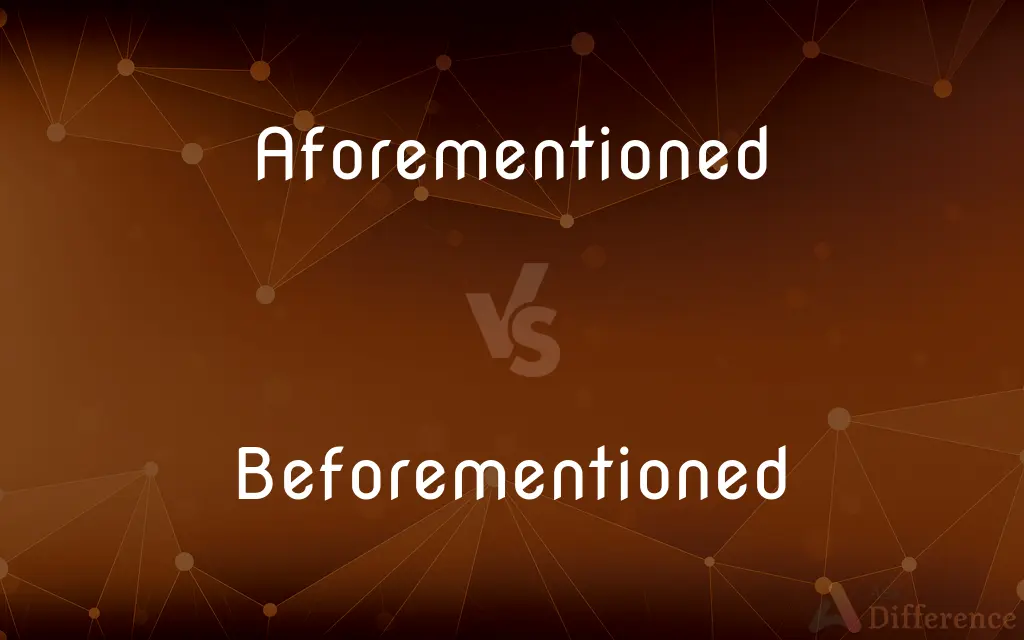Aforementioned vs. Beforementioned — What's the Difference?
By Maham Liaqat & Urooj Arif — Updated on March 5, 2024
Aforementioned refers to something previously mentioned, emphasizing its earlier mention, while beforementioned is rarely used and often considered outdated or incorrect for "aforementioned."

Difference Between Aforementioned and Beforementioned
Table of Contents
ADVERTISEMENT
Key Differences
Aforementioned is a formal term used in written and spoken English to refer to something that has been mentioned earlier in a text or conversation. It serves to avoid repetition by directly referencing the subject or subjects previously discussed. Beforementioned, though understood to mean the same as "aforementioned," is far less common and is generally not used in contemporary English. It may appear in very old texts or in certain dialects but is often considered a mistaken form of "aforementioned" in standard usage.
The use of "aforementioned" helps in creating a clear and coherent structure within a document or speech, ensuring that the reader or listener can easily follow the references to previously mentioned information. On the other hand, the rarity and general non-use of "beforementioned" mean that its presence can potentially confuse readers or be seen as an error, detracting from the credibility or clarity of the text. Professional editors and writers would typically replace "beforementioned" with "aforementioned" or another term like "previously mentioned" to maintain standard language usage.
While "aforementioned" is widely accepted and understood in formal contexts, the attempt to use "beforementioned" might suggest a misunderstanding of formal English terms or an attempt to mimic formal style without full knowledge of the correct terminology.
The distinction between these terms underscores the importance of adhering to contemporary standards of language use, especially in formal or professional writing, where clarity, precision, and adherence to recognized standards are paramount.
Comparison Chart
Definition
Refers to something mentioned earlier in text.
Rarely used, often considered incorrect.
ADVERTISEMENT
Usage
Common in formal texts.
Uncommon and considered outdated.
Contemporary Use
Widely accepted and understood.
Not recommended for use.
Context
Legal documents, academic writing.
Generally avoided in modern writing.
Correctness
Considered the correct term.
Considered a mistake or outdated.
Compare with Definitions
Aforementioned
Used in formal writing.
The aforementioned article outlines current challenges.
Beforementioned
Intended to refer to earlier content.
The results from the beforementioned research were inconclusive.
Aforementioned
Referring to earlier content.
The profits from the aforementioned project exceeded expectations.
Beforementioned
Supposedly previously mentioned.
The beforementioned arguments lack substantial evidence.
Aforementioned
Indicates prior mention.
The strategies of the aforementioned companies vary widely.
Beforementioned
Attempt at formal writing.
The beforementioned case was settled out of court.
Aforementioned
Previously mentioned in text.
The aforementioned studies highlight the issue's complexity.
Beforementioned
Hypothetically indicates prior mention.
The impact of the beforementioned policies is still under review.
Aforementioned
Serves for clarity.
The aforementioned examples illustrate the point clearly.
Beforementioned
Meant to serve for clarity.
The beforementioned figures are subject to change.
Aforementioned
Mentioned previously.
Beforementioned
Previously mentioned.
Aforementioned
The one or ones mentioned previously.
Aforementioned
Previously mentioned.
It wasn't until later that we realized that the aforementioned caller and this taciturn man were the same person.
Aforementioned
Previously mentioned; before-mentioned.
Aforementioned
Being the one previously mentioned or spoken of;
Works of all the aforementioned authors
Said party has denied the charges
Common Curiosities
Is "beforementioned" a correct English term?
"Beforementioned" is generally considered outdated or incorrect, and "aforementioned" is the preferred term.
What does "aforementioned" mean?
Aforementioned is a term used to refer back to something that has been mentioned earlier in a text or conversation.
How can I replace "beforementioned" in my writing?
Replace "beforementioned" with "aforementioned" or phrases like "previously mentioned" to adhere to standard English usage.
Does "aforementioned" have synonyms?
Yes, terms like "previously mentioned," "earlier stated," or "mentioned above" can serve as synonyms, depending on the context.
Is "aforementioned" only used in academic writing?
No, "aforementioned" is used in various formal contexts, including legal documents, business reports, and academic writing, to refer to previously mentioned information.
Can I use "aforementioned" in informal writing?
While more common in formal writing, "aforementioned" can be used in informal writing to refer to previously mentioned items, though simpler terms like "mentioned before" are often preferred.
How does "aforementioned" improve writing?
It helps avoid repetition by clearly referring back to subjects or objects previously discussed, thereby maintaining coherence in the text.
What's the importance of using "aforementioned"?
Using "aforementioned" correctly contributes to the precision, clarity, and formality of written communication, especially in contexts where referring to previous discussions or points is necessary.
Why is "aforementioned" preferred over "beforementioned"?
"Aforementioned" is the standard term recognized and used in contemporary English, ensuring clarity and correctness in formal writing.
Can "beforementioned" be used in legal documents?
It's not recommended to use "beforementioned" in legal documents or any formal writing due to its outdated status and potential for confusion. "Aforementioned" is the appropriate term.
Share Your Discovery

Previous Comparison
Eye vs. Camera
Next Comparison
Attire vs. ClothesAuthor Spotlight
Written by
Maham LiaqatCo-written by
Urooj ArifUrooj is a skilled content writer at Ask Difference, known for her exceptional ability to simplify complex topics into engaging and informative content. With a passion for research and a flair for clear, concise writing, she consistently delivers articles that resonate with our diverse audience.
















































